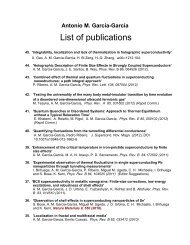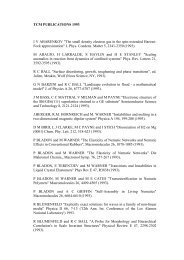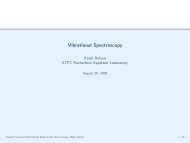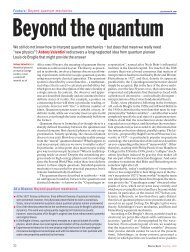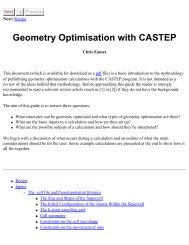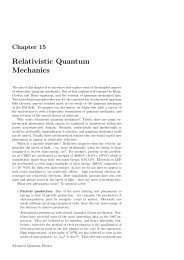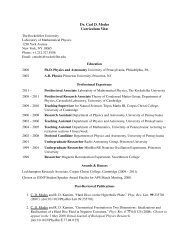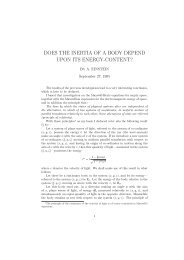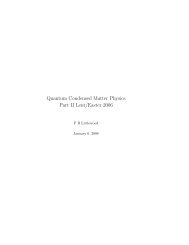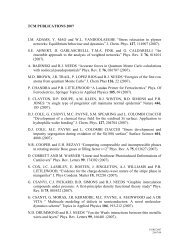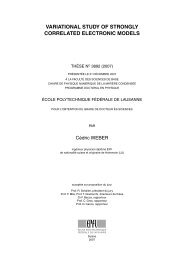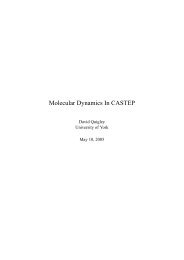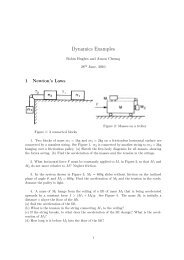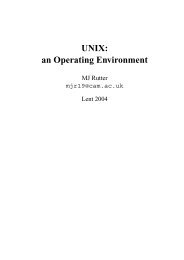CASINO manual - Theory of Condensed Matter
CASINO manual - Theory of Condensed Matter
CASINO manual - Theory of Condensed Matter
You also want an ePaper? Increase the reach of your titles
YUMPU automatically turns print PDFs into web optimized ePapers that Google loves.
- : perform compilation (default).<br />
- clean : remove object files.<br />
- vclean : remove object files and binaries.<br />
E.g., one can type:<br />
make<br />
make opt<br />
make NoFeatures<br />
make NoFeatures/opt<br />
make n<strong>of</strong>eatures/opt<br />
to the same effect.<br />
For the ’clean’ and ’vclean’ targets, ’all’ can be used to refer<br />
to all features or versions, e.g.:<br />
make all.clean<br />
# same as ’make NoFeatures/all.vclean’<br />
make all/dev.vclean<br />
make Openmp/all.vclean<br />
make openmp/all.vclean<br />
make all/all.vclean<br />
You can also type ‘make info’ in the base directory to get a print out <strong>of</strong> all the compilers and compiler<br />
flags that casino will use, without invoking any actual compilation.<br />
To run the code you need to add the $HOME/<strong>CASINO</strong>/bin qmc directory to your shell path, e.g., through<br />
(bash):<br />
export PATH="$PATH:/YOUR_HOME_DIRECTORY/<strong>CASINO</strong>/bin_qmc"<br />
so that your shell can pick up all the executable casino utilities.<br />
automatically).<br />
(The install script will do this<br />
5.1.6 Running the code<br />
You run the code using the ‘runqmc’ script (see section 6.6). This script is able to access all the run<br />
time information in the arch file to determine how to run jobs on your machine - even to the extent<br />
<strong>of</strong> loading modules, writing batch scripts, and submitting them for you.<br />
You can run the various utilities just by typing their name.<br />
5.2 The <strong>CASINO</strong> ARCH system<br />
In this section, we give further details <strong>of</strong> how some <strong>of</strong> these things work.<br />
As already stated, casino determines what kind <strong>of</strong> computer you are running on by looking at the<br />
value <strong>of</strong> the Unix environment variable <strong>CASINO</strong> ARCH, which must be defined in your shell session.<br />
The ‘arch/data’ subdirectory <strong>of</strong> the casino distribution contains architecture data files which define<br />
system-specific parameters for compiling and running the code. Include files in this directory are<br />
named <strong>CASINO</strong> ARCH.arch, and contain information about which set <strong>of</strong> parameters to use, including<br />
compiler name, compiler flags, library locations, how to submit jobs, etc. <strong>CASINO</strong> ARCH should be set<br />
permanently on your machine, and will be re-used when installing future versions.<br />
While there is no fundamental difference between <strong>CASINO</strong> ARCHs, we define two conceptual types for<br />
convenience, which simply differ in purpose and naming convention:<br />
• ‘Generic’ <strong>CASINO</strong> ARCHs are intended to represent a class <strong>of</strong> systems. Their name is typically <strong>of</strong><br />
one <strong>of</strong> these forms:<br />
- Single-processor workstations:<br />
- e.g. linuxpc-ifort<br />
- Multi-processor workstations:<br />
9



